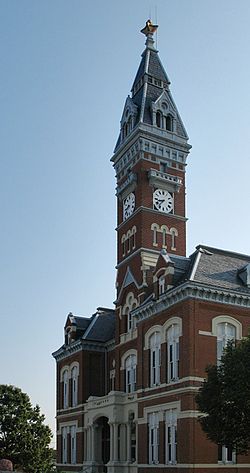Maryville, Missouri
| Maryville, Missouri | |
|---|---|
| City | |

Nodaway County Courthouse, 2006
|
|
 Location within Nodaway County and Missouri |
|
 U.S. Census Map of Maryville |
|
| Coordinates: 40°20′43″N 94°52′16″W / 40.34528°N 94.87111°WCoordinates: 40°20′43″N 94°52′16″W / 40.34528°N 94.87111°W | |
| Country | United States |
| State | Missouri |
| County | Nodaway |
| Platted | 1845 |
| Government | |
| • Type | Mayor–Council |
| • Mayor | Renee Riedel |
| • City Manager | Greg McDanel |
| • City Clerk | Sheila Smail |
| Area | |
| • Total | 5.80 sq mi (15.02 km2) |
| • Land | 5.77 sq mi (14.94 km2) |
| • Water | 0.03 sq mi (0.08 km2) |
| Elevation | 1,152 ft (351 m) |
| Population (2010) | |
| • Total | 11,972 |
| • Estimate (2012) | 12,015 |
| • Density | 2,100/sq mi (800/km2) |
| Time zone | CST (UTC-6) |
| • Summer (DST) | CDT (UTC-5) |
| ZIP code | 64468 |
| Area code | 660 |
| FIPS code | 29-46640 |
| GNIS feature ID | 0721948 |
| Website | maryvillemo.org |
Maryville is a city and county seat of Nodaway County, Missouri, United States. As of the 2010 census, the city population was 11,972. Maryville is home to Northwest Missouri State University, Northwest Technical School, and the Missouri Academy of Science, Mathematics and Computing.
Maryville is the second largest city (first is St. Joseph, Missouri) wholly within the boundaries of the 1836 Platte Purchase which expanded Missouri's borders into former Indian Territory in northwest Missouri.
Maryville was platted on September 1, 1845.
Maryville's name originates from the town's first postmaster, Amos Graham. Graham was one of the original settlers of what would later become downtown Maryville, and the city was named after his wife, Mary. In addition to his above historical role, Graham was also one of the original Nodaway County Commissioners and served as the first county clerk when the county was formally organized in 1845. Maryville, which is near the geographic center of Nodaway County, was also named the county seat in the same year.
The first courthouse was built in 1846. Formerly, county government affairs would be held in the home of an early settler, I.N. Prather. An updated courthouse was constructed in 1853, the second of only three in the city's history. The current courthouse was built in 1881 with a design by Edmond Jacques Eckel and George R. Mann. Mann would later go on to design the Arkansas State Capitol. The courthouse is currently listed on the National Register of Historic Places and is adorned with a sculpture of a pineapple, the sign of welcome. The original court complex included one of the country's only rotary jails. The jail was torn down in 1984 and replaced with a new structure on the same site.
...
Wikipedia
